#lm 5.1.19
Explore tagged Tumblr posts
Text


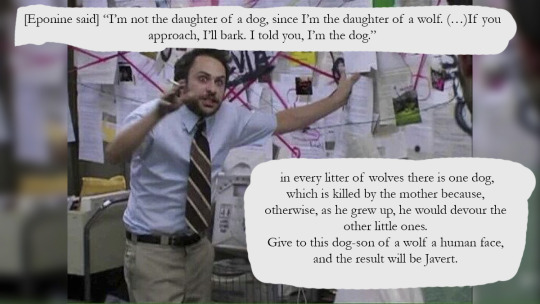

Feeling normal about Javert and Eponine today
#les mis#les mis letters#lm 5.1.19#im very normal about em#i was going to write an essay about them for today#but have this instead#javert-eponine parallels#javert/eponine parallels
6K notes
·
View notes
Text
I always thought the "You annoy me. Kill me, rather" line was delivered right after Valjean cuts the ropes and frees Javert (thanks Les Mis '78 brainrot I guess), but I just reread this bit and realised Javert walks away up the street for several MINUTES before turning around and shouting it to Valjean at the top of his lungs.
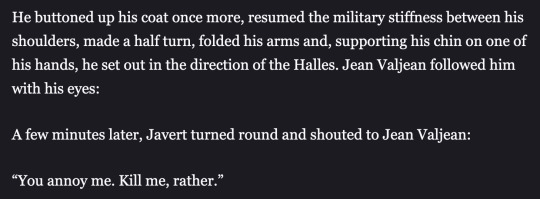
why is he like this
#javert#the brick#the brick quotes#lm 5.1.19#les mis#les miserables#les misérables#sylvie's own nonsense
403 notes
·
View notes
Text
Round 1, Matchup 191: IV.xi.2 vs V.i.19
17 notes
·
View notes
Text
Jean Valjean Takes His Revenge
When Jean Valjean was left alone with Javert, he untied the rope which fastened the prisoner across the middle of the body, and the knot of which was under the table. After this he made him a sign to rise.
Javert obeyed with that indefinable smile in which the supremacy of enchained authority is condensed.
Jean Valjean took Javert by the martingale, as one would take a beast of burden by the breast-band, and, dragging the latter after him, emerged from the wine-shop slowly, because Javert, with his impeded limbs, could take only very short steps.
Jean Valjean had the pistol in his hand.
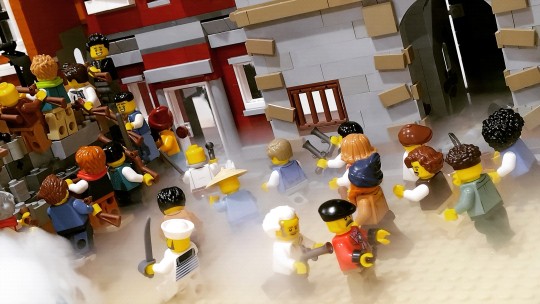
In this manner they crossed the inner trapezium of the barricade. The insurgents, all intent on the attack, which was imminent, had their backs turned to these two.
Marius alone, stationed on one side, at the extreme left of the barricade, saw them pass. This group of victim and executioner was illuminated by the sepulchral light which he bore in his own soul.
Jean Valjean with some difficulty, but without relaxing his hold for a single instant, made Javert, pinioned as he was, scale the little entrenchment in the Mondétour lane.
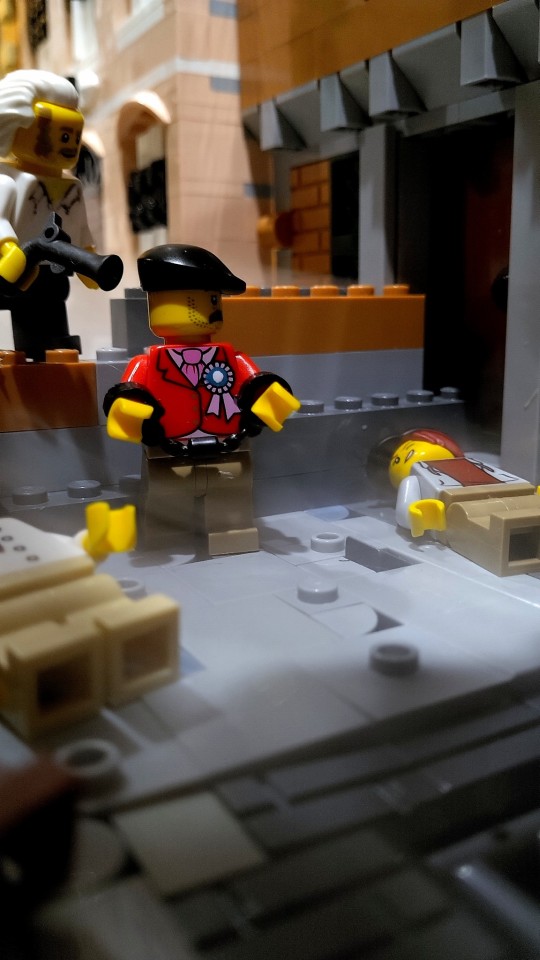
When they had crossed this barrier, they found themselves alone in the lane. No one saw them. Among the heap they could distinguish a livid face, streaming hair, a pierced hand and the half nude breast of a woman. It was Éponine. The corner of the houses hid them from the insurgents. The corpses carried away from the barricade formed a terrible pile a few paces distant.
Javert gazed askance at this body, and, profoundly calm, said in a low tone:
“It strikes me that I know that girl.”
Then he turned to Jean Valjean.
Jean Valjean thrust the pistol under his arm and fixed on Javert a look which it required no words to interpret: “Javert, it is I.”
Javert replied:
“Take your revenge.”
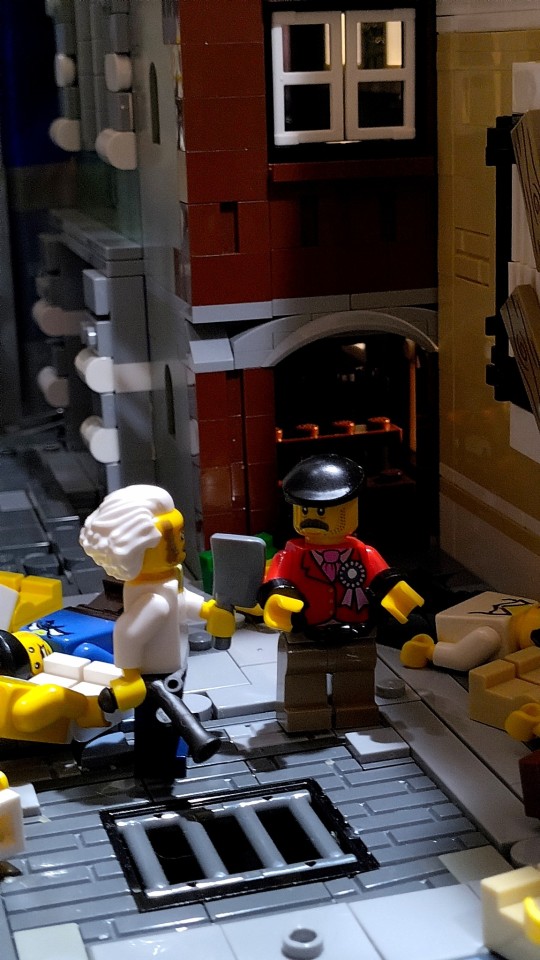
Jean Valjean drew from his pocket a knife, and opened it.
“A clasp-knife!” exclaimed Javert, “you are right. That suits you better.”
Jean Valjean cut the martingale which Javert had about his neck, then he cut the cords on his wrists, then, stooping down, he cut the cord on his feet; and, straightening himself up, he said to him:
“You are free.”
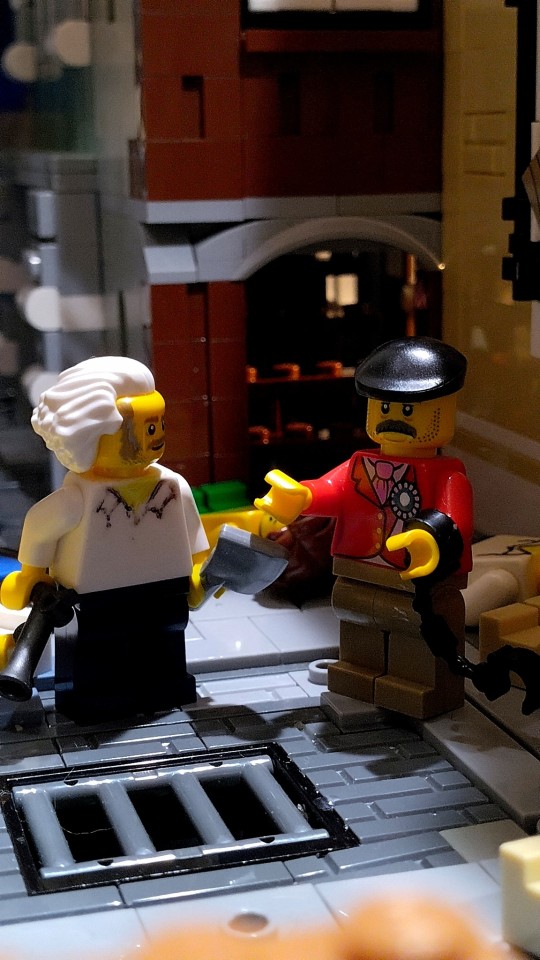
Javert was not easily astonished. Still, master of himself though he was, he could not repress a start. He remained open-mouthed and motionless.
Jean Valjean continued:
“I do not think that I shall escape from this place. But if, by chance, I do, I live, under the name of Fauchelevent, in the Rue de l’Homme Armé, No. 7.”
Javert snarled like a tiger, which made him half open one corner of his mouth, and he muttered between his teeth:
“Have a care.”
“Go,” said Jean Valjean.
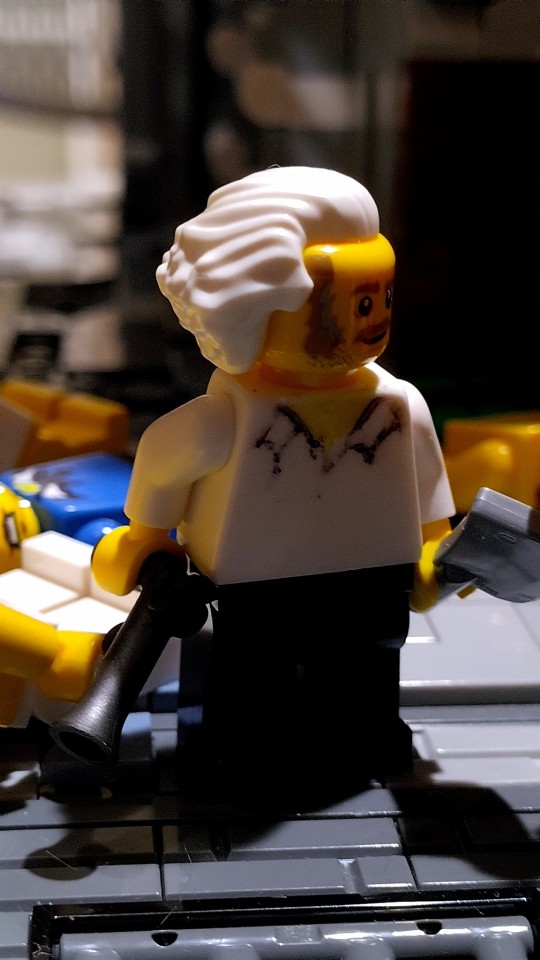
Javert began again:
“Thou saidst Fauchelevent, Rue de l’Homme Armé?”
“Number 7.”
Javert repeated in a low voice:—“Number 7.”
He buttoned up his coat once more, resumed the military stiffness between his shoulders, made a half turn, folded his arms and, supporting his chin on one of his hands, he set out in the direction of the Halles. Jean Valjean followed him with his eyes:
A few minutes later, Javert turned round and shouted to Jean Valjean:
“You annoy me. Kill me, rather.”
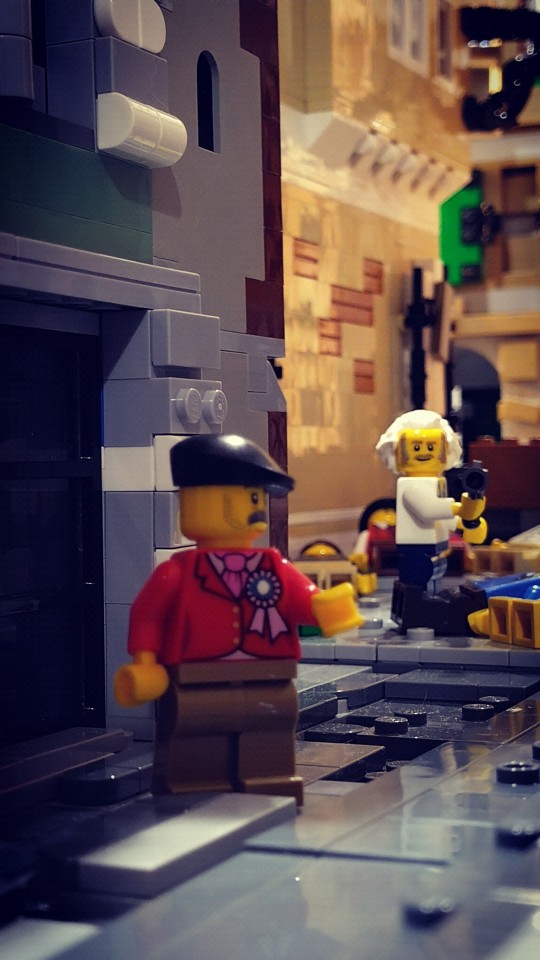
Javert himself did not notice that he no longer addressed Jean Valjean as “thou.”
“Be off with you,” said Jean Valjean.
Javert retreated slowly. A moment later he turned the corner of the Rue des Prêcheurs.
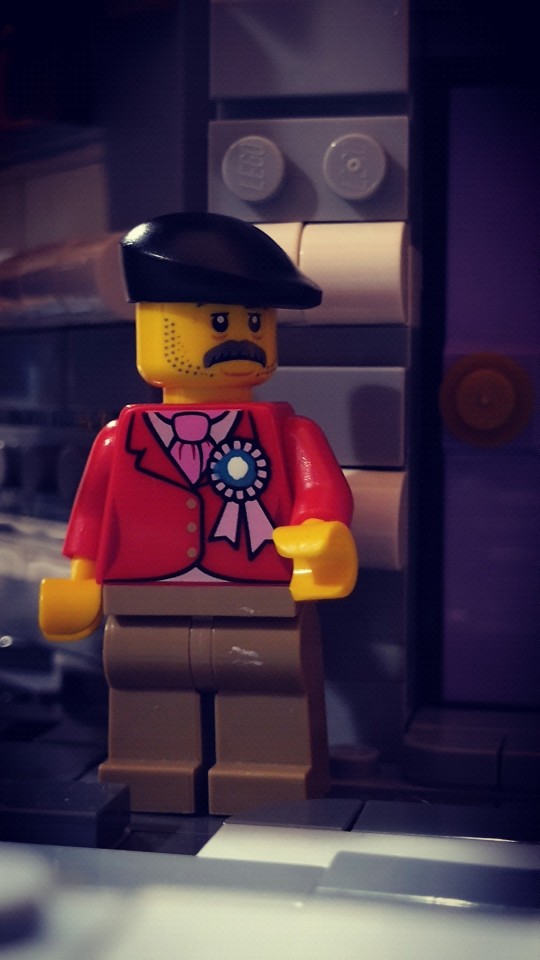
When Javert had disappeared, Jean Valjean fired his pistol in the air.
Then he returned to the barricade and said:
“It is done.”
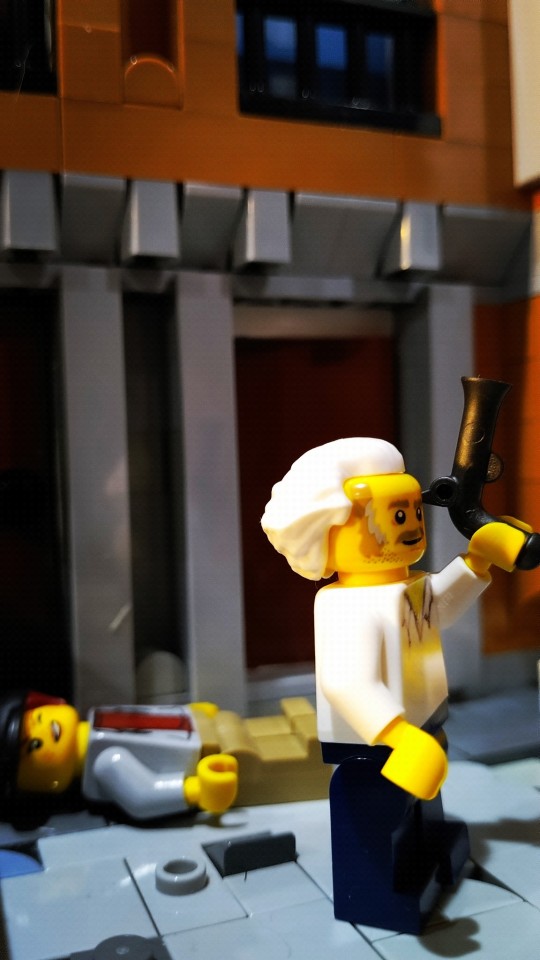
In the meanwhile, this is what had taken place.
Marius, more intent on the outside than on the interior, had not, up to that time, taken a good look at the pinioned spy in the dark background of the tap-room.
When he beheld him in broad daylight, striding over the barricade in order to proceed to his death, he recognized him. Something suddenly recurred to his mind. He recalled the inspector of the Rue de Pontoise, and the two pistols which the latter had handed to him and which he, Marius, had used in this very barricade, and not only did he recall his face, but his name as well.
This recollection was misty and troubled, however, like all his ideas.
It was not an affirmation that he made, but a question which he put to himself:
“Is not that the inspector of police who told me that his name was Javert?”
Perhaps there was still time to intervene in behalf of that man. But, in the first place, he must know whether this was Javert.
Marius called to Enjolras, who had just stationed himself at the other extremity of the barricade:
“Enjolras!”
“What?”
“What is the name of yonder man?”
“What man?”
“The police agent. Do you know his name?”
“Of course. He told us.”
“What is it?”
“Javert.”
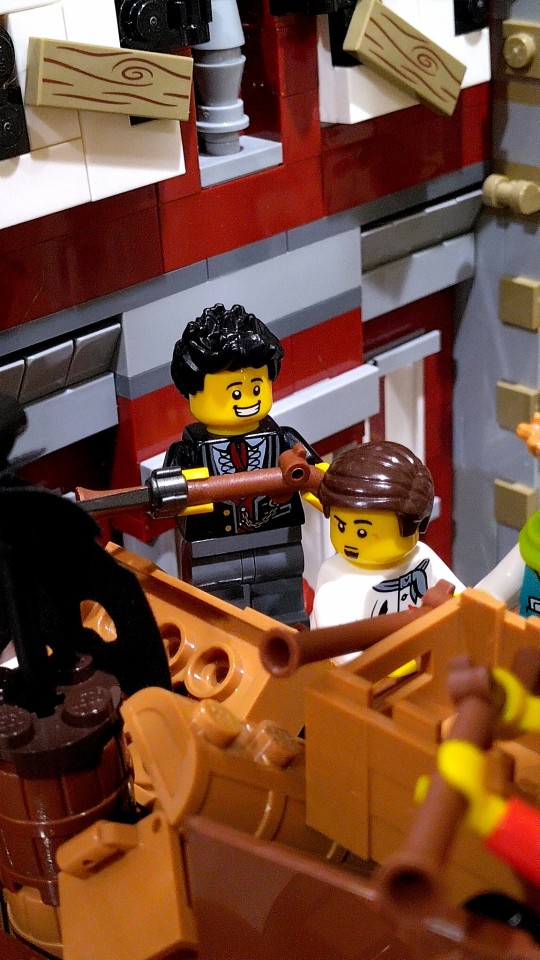
Marius sprang to his feet.
At that moment, they heard the report of the pistol.
Jean Valjean reappeared and cried: “It is done.”
A gloomy chill traversed Marius’ heart.
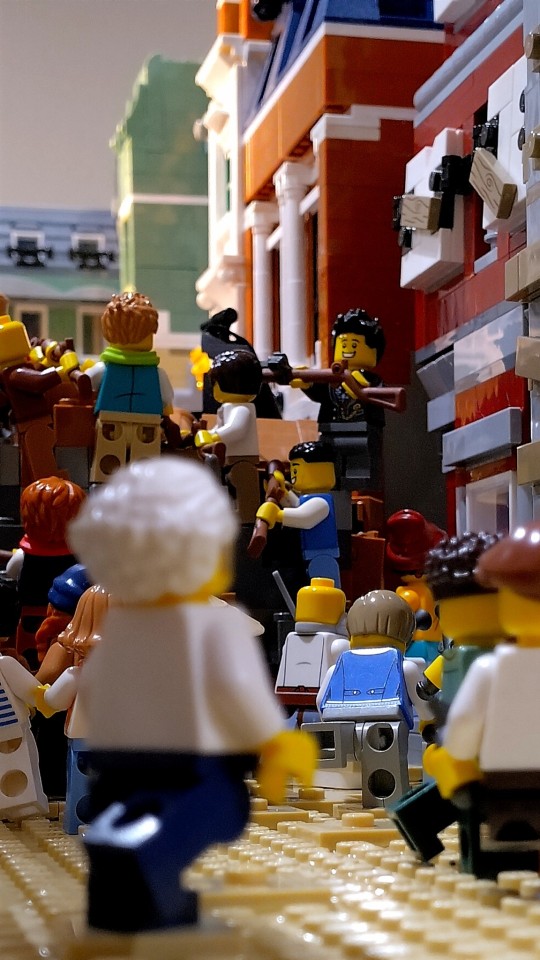
31 notes
·
View notes
Text
Translation notes for LM 5.1.19: Jean Valjean Takes His Revenge
First, I just wanted to highlight two skipped sentences in the Hapgood translation, at the point where we see Éponine. The section in French reads:
“Quand ils eurent enjambé ce barrage, ils se trouvèrent seuls dans la ruelle. Personne ne les voyait plus. Le coude des maisons les cachait aux insurgés. Les cadavres retirés de la barricade faisaient un monceau terrible à quelques pas. On distinguait dans le tas des morts une face livide,...”
The sentences in bold are omitted from the Hapgood translation:
“When they had crossed this barrier, they found themselves alone in the lane. No one saw them. [missing sentences] Among the heap they could distinguish a livid face,...”
With the missing sentences it would read something like:
"When they had crossed this barrier, they found themselves alone in the lane. No one could see them anymore. The bend in the houses hid them from the insurgents. The dead bodies pulled away from the barricade made a terrible heap a few feet away. Among the pile, a pale face could be distinguished..."
Second, I wanted to talk about the famous line, “You annoy me. Kill me, rather.” / “Vous m’ennuyez. Tuez-moi plutôt.”
As a non-native French speaker, the verb "ennuyer" has always given me a bit of trouble in interpretation due to its wide range of translations into English. I would love any input from someone who has a more intuitive grasp of French about what they feel this word expresses in different contexts!
The verb comes from "ennui," a feeling of weariness or dissatisfaction. In French to English dictionaries, you will commonly see the translation as both "to bore" and "to annoy" (along with verbs like "to bother, concern, trouble, worry"). A fun fact for any valvert shippers out there is that in Hugo's time it was also used to mean "to feel nostalgia for" or "to feel annoyed by the absence of something" though it should definitely be noted that the construction of the phrase would have to be different for it to have this meaning (Je m'ennuie de vous). Nevertheless, these are all sentiments that float around the context of this particular word, making it, for me anyway, somewhat difficult to translate.
42 notes
·
View notes
Text
“The supremacy of enchained authority” is such a good way of describing Javert! But his calm remains disturbing.
It’s also awful that this is happening in front of Éponine’s corpse and that Javert vaguely recognizes her. They both share some dog imagery, so they parallel each other in a sense, with Éponine initially defending Marius’ future (by helping him find Cosette and have a romance befitting his imagined status) as Javert defends the social order, but it hurts to be reminded of the fact that she’s been ignored in the chaos of combat.
Not entirely surprisingly, Jean Valjean doesn’t kill Javert. Between his pacifism and his lack of self-worth, it’s not shocking that he’d let the person best poised to ruin his life go free. Interestingly, Javert snarls “like a tiger,” moving to cat imagery. Cats, wild or not, are typically linked to rebellion in the novel, and Valjean was compared to a tiger at the beginning of the novel when he robbed the bishop. For Javert to be compared to a tiger emphasizes just how much this disturbed him. That he demands to be killed (“You annoy me. Kill me, rather” is a funny way to demand being killed, but it’s disturbing nonetheless) and addresses Valjean formally (vous instead of tu) underscores this as well.
Marius recognizes Javert at the worst possible time, but it’s also a bit funny that he’s thinking of his pistol debt at the barricade of all places.
38 notes
·
View notes
Text
Can you imagine? We've been discussing what is happening in Corinthe, on the barricade, and around it for 41 days already! And the events of the morning of 5 June—add another dozen days or so. That was the longest 24 hours I have ever lived through!
30 notes
·
View notes
Text
What’s so interesting about 5.1.19 in Les Mis is how we’ve seen this before. Valjean is now the authority, Javert asks for something he probably shouldn’t want, and Valjean refuses. This is exactly what happened in M-sur-M.
#you see it right?#les mis#les miserables#jean valjean#inspector javert#the brick#lm 5.1.19#I swear to god if I got the chapter number wrong…
43 notes
·
View notes
Note
in the musical, near the end, why does valjean give javert his address and tell him where he can find him, if he knows that'll it'll probably lead to javert arresting him, which will mean cosette will be alone?
To be clear, he does this in the book too!
Jean Valjean cut the martingale which Javert had about his neck, then he cut the cords on his wrists, then, stooping down, he cut the cord on his feet; and, straightening himself up, he said to him: “You are free.” Javert was not easily astonished. Still, master of himself though he was, he could not repress a start. He remained open-mouthed and motionless. Jean Valjean continued: “I do not think that I shall escape from this place. But if, by chance, I do, I live, under the name of Fauchelevent, in the Rue de l’Homme Armé, No. 7.” Javert snarled like a tiger, which made him half open one corner of his mouth, and he muttered between his teeth: “Have a care.” “Go,” said Jean Valjean. Javert began again: “Thou saidst Fauchelevent, Rue de l’Homme Armé?” “Number 7.” Javert repeated in a low voice:—“Number 7.” -LM 5.1.19, Valjean Takes His Revenge (Hapgood translation)
As to why he does it...well that's a really good question, and it's one of those things that is fodder for endless discussion! Some known emotional factors: - he already feels his life is over, since Cosette will be getting married and "leaving"him - he doesn't think Cosette will be alone if he lives, since he's going to bring her Marius, and he expects Marius to take care of Cosette now - he already feels like he can never truly escape the bagne, as we see in his confession with Marius. So he may feel he's just yielding to the inevitable? More options: - he's really trying to save Javert's life (he is!) and thinks offering his address will help convince Javert to leave -maybe he's not so confident of escape himself, and thinks he won't be there to be arrested--and this way at least someone will tell Cosette where he was? - Other Options Up To The Reader! Basically it's hugely up to interpretation! Which is fascinating, right? Such a big moment in the story, and Hugo basically turns to the audience and invites us to try and understand why Valjean makes his choices here the way he does. And then the musical follows that cue!
So what are your ideas about it, Nonny? :D
#Valjean talk#Valjean takes his revenge#Valjean does a LOT of stuff that makes me go Why#and usually making the reader ask is part of the point#then again sometimes he eats sewer bread and I gotta go WHYYYYYY#and I know why actually and it's just a terrible life choice XD
37 notes
·
View notes
Text
Brickclub 5.1.19 “Jean Valjean takes his revenge”
Marius’s sense of morality is wild.
This memory, however, was misty and indistinct, like all his ideas. It was not an affirmation he was making to himself, it was a question: "Isn't this that police inspector who told me his name was Javert?"
Perhaps there was still time to intervene for this man? But he would first have to know if it were indeed that Javert.
HOW does he think ethics works? What is even the logic here? “If I’ve met this man in my life before this, it is my solemn duty to save him; if I haven’t, let him die who cares.”
All of which of course leaves aside the pretty pressing point that Marius still hasn’t learned that Cops Aren’t His Friends. God, he’s not paying attention. He never is, of course. I shouldn’t be surprised.
But he’s also not engaging with any of the coherent moralities. There’s “pragmatic acts up to and including killing enemy combatants and spies need to be done when one is participating in a war that one believes is worth waging” or there’s “all lives are worth saving to the best of one’s ability” which are both positions one could theoretically take. But he’s not even achieving Combeferre’s dubious and confused mashup of the two of those.
I mean, it’s not not a very human thing to do, being able to sympathize better with people you’ve interacted with, but. I just. I can’t get over “I need to find out this guy’s name to know if I’m honor bound to save him by virtue of having met him once.”
That’s not even Marius’s weird gratitude thing. Wtf IS that?
...Unless his gratitude thing applies even to “gave me pistols once.” Oh god, it might. Is this seriously about the fact that Javert once did him the stupidest of slight favors? Oh my god. Marius, those pistols were a blight on your life, you’re VERY well rid of them.
And then there’s Valjean’s reasoning about who to save. Like Marius, he hasn’t at all thought about what harm Javert might do to any of the insurgents here, should they happen to live. Valjean is specifically focusing his saving people on... well, it’s not “anybody I met one time”; it seems to be more like “I’m going to save specifically the people I think are guaranteed to ruin my life.”
Which is also weird, but it’s extremely Valjean.
Meanwhile, Javert’s straightening his coat and squaring his shoulders reminds me very much of Valjean stealing the coin from Petit-Gervais. Something has changed so suddenly and irrevocably for him that the only thing he knows how to do is pantomime the forms and actions of the old self he hasn’t realized yet that he’s lost.
29 notes
·
View notes
Text
if there is a god watching over jean valjean i bet he's just super exhausted. when valjean takes javert out behind the barricade and pretends to execute him god's probably watching that like okay you could have just saved his life and let him go, you didn't have to also give him your address so he could come arrest you later. like come on dude. just don't do that part. it is a full-time job looking out for you, would it kill you to throw me a bone here? ben affleck smoking dot jpg.
#les mis#lm 5.1.19#my posts#it's been a while since we've had a 'let's take a look-see inside jean valjean's brain and see what this wacky guy is thinking!' chapter#so i'm just like dude wyd?? wyd bro???? why are you doing that????#he's currently carting marius's dead weight through the parisian sewers and he just laid him down so so so gently and bandaged his#wounds and then 'looked at him with an inexplicable hatred'#kay cool. like what is going on in that there noggin of yourn sonny boy?#f
332 notes
·
View notes
Text
I love how smug Javert is at the barricade, how pompous he is about submitting to his capture, and how pompously he acts that everything is proving him right. One thing I judge a lot of adaptations by is their portrayal of Javert after his capture— most adaptations portray him as being afraid or upset, when in the novel he’s much more unhinged. He’s not afraid to die at all. He doesn’t value his life. He is instead this happy smug martyr, haughty about serving authority, gleefully making smug pompous jokes about how he knew this all would happen and he knew they’d all behave this way and how he can’t wait for everyone here to die.
Javert is led away to his execution going “so much for the ‘tolerant’ left!”
#he spends his entire execution time trying to Own the Libs#les mis#les mis letters#lm 5.1.19#something is terribly wrong in his empty littlr skull
145 notes
·
View notes
Text
I'm feeling a little insane about Javert recognising Éponine at the barricade, whereas the people who should actually know and care about her repeatedly fail to recognise her!!!
here's her own father, Thénardier, not recognising her (4.8.4):
At the same moment, he perceived a pale girl standing before him. The man underwent that shock which the unexpected always brings. He bristled up in hideous wise; nothing is so formidable to behold as ferocious beasts who are uneasy; their terrified air evokes terror. He recoiled and stammered:— “What jade is this?” “Your daughter.” It was, in fact, Éponine, who had addressed Thénardier.
and here's Marius not recognising her (4.14.6):
The fire-pot allowed him to distinguish a blouse, torn trousers of coarse velvet, bare feet, and something which resembled a pool of blood. Marius indistinctly made out a pale head which was lifted towards him and which was saying to him:— “You do not recognize me?” “No.” “Éponine.”
but Javert, who knows her only as a juvenile delinquent he's arrested before—Javert recognises her, even after she's dead.
Javert gazed askance at this body, and, profoundly calm, said in a low tone: “It strikes me that I know that girl.”
I would also venture to say that the fact he brings it up at all, especially at such a critical moment (he's literally about to be shot as far as he knows), illustrates that he is actually bothered by this on some level.
(this train of thought was prompted by @secretmellowblog's excellent post about Javert + Éponine parallels)
#javert#eponine#éponine#the brick#analysis#lm 4.8.4#lm 4.14.6#lm 5.1.19#jean valjean takes his revenge#les mis letters#les mis#les miserables#les misérables#sylvie's own nonsense
331 notes
·
View notes
Text
Round 2, Matchup 102: V.i.19 vs V.vi.2
16 notes
·
View notes
Text
It’s the last short-ish and entertaining chapter before the sequence of long and extremely painful ones. There are several moments here that are open for multiple interpretations.
Javert noticing Éponine’s body, singling her out of “a terrible pile” of corpses, is an interesting detail, suggesting that Hugo wants us to draw a link between Javert and Éponine. Javert appears to be genuinely surprised to recognize her, as he says it aloud. I imagine that her corpse was the only female body in the pile. And now I am angry at Marius: Javert, who saw Éponine only once, maybe twice in his life, somehow recognized her, while Marius failed to immediately recognize her almost each time they met. Furthermore, he did not have enough decency to take her body away from the street – though he did this for Gavroche. It seems that his stupid sense of obligation towards Thénardier never involved Éponine. Anyway, Javert is the last person who, in his peculiar way, conveyed a symbolic farewell to Éponine.
“You annoy me. Kill me, rather.” Javert was not the only one annoyed to the point of self-destruction. I believe that Jean Valjean giving Javert his address is also motivated by a similar kind of annoyance. In this case, a horrible end is better than an endless horror. But their dynamic at this moment is so entertaining! So tense. I wonder how Javert’s head didn’t just blow up! And switching from vous to tu or vice versa is also very telling. Javert addressing Valjean tu all the time but switching to vous in “You annoy me.” And Valjean being polite and addressing Javert with vous.
Marius out of blue wanting to intervene before it’s too late to save Javert – it’s just typical Marius. This is something similar to his never-ending urge to thank Thénardier. Perhaps, he feels obliged to Javert for whatever he thinks happened in the Gorbeau hut. Because he is Marius and he has a strange, bourgeois sense of honour and morality. I won’t even try to understand it. But plot-wise, it is important for his further relations with Valjean.
24 notes
·
View notes
Text
V.i.19 Jean Valjean se venge
Jean Valjean Takes His Revenge: WIlbour, Hapgood, Gray, FMA, Donougher
Jean Valjean Revenges Himself: Wraxall
The Vengeance of Jean Valjean: Denny
Jean Valjean Gets His Revenge: Rose
4 notes
·
View notes